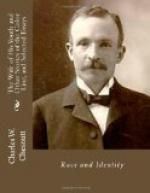“Free to do what?” replied the mulatto. “Free in name, but despised and scorned and set aside by the people to whose race I belong far more than to my mother’s.”
“There are schools,” said the sheriff. “You have been to school.” He had noticed that the mulatto spoke more eloquently and used better language than most Branson County people.
“I have been to school, and dreamed when I went that it would work some marvelous change in my condition. But what did I learn? I learned to feel that no degree of learning or wisdom will change the color of my skin and that I shall always wear what in my own country is a badge of degradation. When I think about it seriously I do not care particularly for such a life. It is the animal in me, not the man, that flees the gallows. I owe you nothing,” he went on, “and expect nothing of you; and it would be no more than justice if I should avenge upon you my mother’s wrongs and my own. But still I hate to shoot you; I have never yet taken human life—for I did not kill the old captain. Will you promise to give no alarm and make no attempt to capture me until morning, if I do not shoot?”
So absorbed were the two men in their colloquy and their own tumultuous thoughts that neither of them had heard the door below move upon its hinges. Neither of them had heard a light step come stealthily up the stairs, nor seen a slender form creep along the darkening passage toward the mulatto.
The sheriff hesitated. The struggle between his love of life and his sense of duty was a terrific one. It may seem strange that a man who could sell his own child into slavery should hesitate at such a moment, when his life was trembling in the balance. But the baleful influence of human slavery poisoned the very fountains of life, and created new standards of right. The sheriff was conscientious; his conscience had merely been warped by his environment. Let no one ask what his answer would have been; he was spared the necessity of a decision.
“Stop,” said the mulatto, “you need not promise. I could not trust you if you did. It is your life for mine; there is but one safe way for me; you must die.”
He raised his arm to fire, when there was a flash—a report from the passage behind him. His arm fell heavily at his side, and the pistol dropped at his feet.
The sheriff recovered first from his surprise, and throwing open the door secured the fallen weapon. Then seizing the prisoner he thrust him into the cell and locked the door upon him; after which he turned to Polly, who leaned half-fainting against the wall, her hands clasped over her heart.
“Oh, father, I was just in time!” she cried hysterically, and, wildly sobbing, threw herself into her father’s arms.
“I watched until they all went away,” she said. “I heard the shot from the woods and I saw you shoot. Then when you did not come out I feared something had happened, that perhaps you had been wounded. I got out the other pistol and ran over here. When I found the door open, I knew something was wrong, and when I heard voices I crept upstairs, and reached the top just in time to hear him say he would kill you. Oh, it was a narrow escape!”




